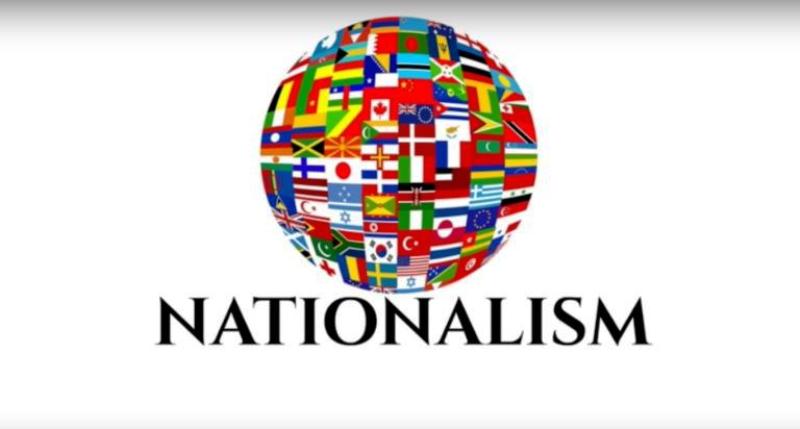Nationalism definition: Nationalism is an ideology or belief system that emphasizes the importance of a strong sense of national identity, often based on shared cultural, linguistic, historical, or religious characteristics. It is the idea that a nation is a natural and fundamental unit of society and that the nation’s interests and well-being should be prioritized over those of other nations or international organizations.
What is Nationalism ?
Nationalism can take many forms, from peaceful and inclusive expressions of cultural pride and identity to more extreme and exclusionary forms that reject and demonize other cultures, races, or religions. Nationalism can also have both positive and negative consequences, depending on how it is practiced and how it is used by political leaders and social movements.
Some scholars view nationalism as a product of modernization and industrialization, while others see it as a timeless and universal aspect of human identity and social organization. Regardless of its origins and evolution, nationalism continues to shape politics, culture, and social relations around the world today.
What is difference Nationalism and Patriotism ?
Nationalism and patriotism are two concepts that are often used interchangeably, but they have distinct meanings.
Patriotism is a feeling of love, devotion, and loyalty towards one’s country. It is an emotional attachment to one’s homeland and a willingness to defend it against threats.
Nationalism, on the other hand, is a political ideology that emphasizes the importance of a nation’s cultural, historical, and linguistic identity. It often includes a belief in the superiority of one’s own nation over others and a desire for political independence or unity.
While patriotism can be seen as a positive and inclusive sentiment that unites people around a shared love for their country, nationalism can sometimes lead to exclusionary and divisive attitudes that emphasize differences between nations.
In some cases, nationalism has been associated with aggressive or expansionist policies, while patriotism is generally associated with a more defensive posture.
Overall, while both concepts involve love for one’s country, nationalism tends to be more politically charged and divisive, while patriotism is more focused on a sense of personal attachment and emotional connection to one’s country.
Nationalism in America
Nationalism is a complex and often controversial topic in America, encompassing a range of ideas and beliefs about what it means to be American and how the country should be governed. While many Americans take pride in their national identity and celebrate the country’s history and traditions, others are skeptical of nationalism and worry that it can lead to exclusionary or even dangerous forms of political ideology.
At its core, nationalism in America is a belief in the importance of the nation-state and its sovereignty, as well as a commitment to the shared values and ideals that define the country. This includes a belief in democracy, individual freedom, and the rule of law, as well as a sense of solidarity and collective identity that binds Americans together.
However, nationalism in America is not a monolithic ideology, and there are many different strands of thought that fall under its umbrella. Some forms of American nationalism emphasize a sense of exceptionalism, or the belief that America is a unique and exceptional nation that has a special role to play in the world. This can sometimes lead to an attitude of isolationism or an unwillingness to cooperate with other countries or international organizations.
Other forms of nationalism in America are more inclusive and emphasize the diversity of the country’s population. This includes a belief in the value of immigration and the contributions that immigrants have made to American society, as well as a commitment to protecting the rights of minorities and marginalized groups.
Despite these varied perspectives, nationalism in America has become increasingly contentious in recent years, as political polarization and social divisions have deepened. Some critics argue that certain forms of American nationalism have become exclusionary or even racist, with a focus on white supremacy or a belief in the superiority of certain ethnic or cultural groups.
Others worry that nationalism in America can lead to a dangerous form of “us versus them” thinking, with a willingness to demonize or dehumanize those who are perceived as outsiders or enemies. This can lead to a breakdown in civil discourse and a rise in political violence or even extremism.
Despite these concerns, however, nationalism remains an important part of American political and cultural life, and it will continue to shape the country’s future in important ways. Whether it takes the form of a more inclusive and diverse nationalism or a more exclusive and divisive one, the role of nationalism in America is likely to be a subject of ongoing debate and discussion for many years to come.
Meaning of Nationalism in 2023
Nationalism refers to a political ideology that emphasizes the importance and primacy of the nation-state and the interests of its citizens over those of other nations or international organizations. In 2023, nationalism continues to be a complex and controversial topic, with different interpretations and implications depending on the context and country.
In some countries, nationalism is seen as a positive force that promotes unity, pride, and a sense of belonging among citizens. Nationalist movements may advocate for greater autonomy or independence for a particular region or group within a country, or they may emphasize traditional values, cultural heritage, and national identity in opposition to globalization or multiculturalism.
In other countries, nationalism is viewed with suspicion or even hostility, particularly if it is associated with xenophobia, racism, or aggressive foreign policy. Critics of nationalism argue that it can lead to exclusionary policies, discrimination against minorities, and a dangerous “us vs. them” mentality that undermines international cooperation and peace.
Overall, the meaning of nationalism in 2023 is shaped by a complex interplay of historical, cultural, and political factors, and its implications depend on the specific circumstances and values of each society.


